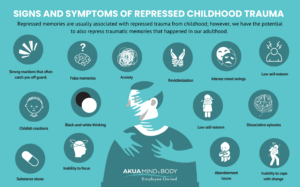Trauma can occur in all forms, shapes, and sizes throughout every era. It can come in the form of neglect in our childhood, physical abuse in a romantic relationship, witnessing a violent event or natural disaster, etc.
Do you ever think, “I know my life was not perfect growing up, but suddenly I am flooded with images I never knew existed, and I can’t function; what is wrong with me”?
“Why now”?
“Am I going crazy?”
“I was fine before, but now I am struggling.”
“I went to therapy as a child; why am I dealing with this now as an adult?’
Why do we repress our childhood trauma?
Repressed memories are usually associated with repressed trauma from childhood; however, we have the potential to also repress traumatic memories that happened in our adulthood. Examples of childhood trauma include severe bullying, physical and verbal abuse, neglect, death/illness of a caretaker, sexual abuse, abandonment, etc.
The intensity of these traumatic events can be so much to the point that we often initially shut down the emotional memory because our brain cannot “digest” what happened. This repression is a defense mechanism to allow us to continue functioning and survive daily. For the most part, repressed memories are involuntary responses to a traumatic event and not a conscious decision you have made. Because children usually can’t prevent traumatic events, repressing them can be their way of coping. Our brain and body put these traumatic memories into a “deep freeze” so we can show up for school and work, tend to our relationships, and be present.
Your body will always remember
Even when these traumatic memories are stored away, and we truly believe “we are out of the woods,” our body always remembers. Even the slightest triggers can result in flooding of these traumatic memories and the intense emotions that come with them. We may not even be exposed to triggers associated with our past trauma, for these repressed memories to come out of nowhere and leave us feeling paralyzed. No matter how much time has passed, we may still have nightmares or flashbacks about what happened that we do not fully understand.

Signs and symptoms of repressed childhood trauma
- Strong reactions that often catch you off guard: You may have a strong visceral reaction to a person you just met because they remind you of your past trauma.
- Anxiety
- False memories: false memories are not memories or stories you made up but things you vividly remember happening to you. However, they never actually occurred, almost like believing your dreams are real. Some experts believe that false memories are the mind’s way of trying to ‘fill in the gaps’ left by episodes of dissociative amnesia.
- Childish reactions
- Black-and-white thinking
- Substance abuse: misusing drugs or alcohol is often an unhealthy coping mechanism to avoid thinking about your past traumas and the emotions tied to them.
- Inability to focus: when you are unintentionally repressing your trauma, you require a lot of mental “bandwidth” to hide these memories, and as a result, you may have a hard time focusing. You may be easily distracted, forgetful, and disorganized.
- Revictimization: You may unintentionally and unconsciously victimize yourself by seeking abusive relationships, engaging in self-destructive behaviors that prevent you from being successful, neglecting your own needs, or harming or abusing others.
- Intense mood swings that vary from numbness to anger within a brief period.
- Low self-esteem
- Dissociative episodes: During stressful times or heightened emotions, you may feel numb, feel a loss of reality, be in a dreamlike state, be completely zoned out, or have trouble remembering people and places.
- Inability to cope with change
- Abandonment issues can manifest in codependent relationships, lack of commitment, quickly getting attached, severe distrust, jealousy, overthinking, and hypersensitive to criticism.
- Unable to cope with stressful everyday events.
You are ready to process your trauma
You may ask yourself, “I am in a good place in my life, so why are these horrible memories returning?” Because you are safe enough now, and when your body realizes that you are in a stable part of your life, these memories, along with their emotions, come knocking. They want to be heard, processed, and resolved. You have come this far in life and have developed coping skills to be able to navigate through these problematic traumatic events, and your body is telling you that this deep inner part of you is stable enough to address the leftover unhealthy emotions that have been buried for years. When these repressed memories start to come up, triggered or not, and leave you with these difficult emotions to work through, this is your sign that it is time to seek help and work through your past trauma.
Seeking professional help
Working with a therapist who specializes in trauma can help you slowly work through these difficult emotions and your past trauma. The first few sessions can be the most difficult because emotions of sadness, anger, heartache, confusion, loneliness, helplessness, and fear are expressed, and to overcome these emotions in a healthy manner, you must sit with them and learn how to navigate them with new coping skills you are learning in therapy. Anyone who experiences childhood trauma can benefit from treatment, but it is essential to seek therapy if you are experiencing any of the signs and symptoms of repressed childhood trauma.
To learn about processing trauma and the types of trauma therapy, click on these links:




